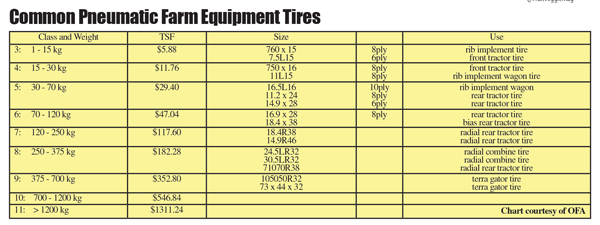
My introduction to tire recycling involved an old car tire tied with poly rope to the huge walnut tree in our front yard.
While swinging on the tire was fantastic fun, my mother soon grew tired of picking plastic shards out of my hands. I also experienced my fair share of rope burns.
These days, old tires are used on the home farm to hold down the pool cover for the winter (even the big rear tractor tires), although I recall the odd patch of black smoke wafting from neighbourhood bush fires. And who could forget the Hagersville, Ont., tire fire of 1990; that particular black cloud lasted a very long time.
Tires are once again in the news within Ontario and many farmers are not pleased with the reason. As of April 1, 2013, the Ontario Tire Stewardship (OTS) has changed its stewardship fee structure from a set fee to a system that covers the actual cost of recycling a tire based on its weight. This has meant steep increases attached to off-road tires, traditionally used in agriculture. While Ontario farmers typically have paid a fee of about $15.29 per tire purchased for use on the farm, in some cases that fee has now increased to hundreds of dollars.
According to the OTS, the changes in recycling fees apply only to tire manufacturers and importers.
“The recycling program that OTS manages is paid for by people who manufacture and supply Ontarians with tires,” said Michael Scott, CEO of Waste Diversion Ontario, which oversees the province’s recycling programs. “It is the manufacturers who decide how their customers pay for these costs, by either including them in the tire price or adding them to the price and displaying this cost on the receipt.”
That’s all fine and dandy but in the end the farmers are going to be the ones stuck with the increased fee.
Ontario’s Progressive Conservative Party has been busy lobbying against the fee changes. PC agriculture critic Ernie Hardeman has launched a petition calling for a stop to the fee increase.
The Ontario Federation of Agriculture also has launched a campaign against the tire fees, urging members to visit the organization’s call-to-action website – www.actnow.ofa.on.ca – to send a letter voicing their concerns to their local MPP.
“The drastic fee increases, which average 400 per cent over the mix of farm tires, came as a surprise to Ontario farmers and the OFA,” said Mark Wales, president of the association. The new fees put Ontario farmers at a competitive disadvantage to those in other provinces and the United States.”
Indeed they do. A quick visit to other provinces’ tire recycling websites shows much cheaper recycling or eco-fees for agriculture tires. In B.C., the recycling fee is $15 per tire; in Alberta, farm and agricultural tires are exempt; in Saskatchewan, tire recycling fees are $15 per tire (up to a maximum of eight tires on new machinery); in Manitoba, recycling fees range from $9 to $30 per tire, depending on the size; and in New Brunswick, agriculture tires are exempt from recycling fees. No information was available on agriculture tire recycling fees in Nova Scotia, P.E.I. or Newfoundland and Labrador.
A visit to the U.S. Environmental Protection Agency’s tire recycling website found that most states charge around $1 per tire for recycling but there was no information on whether that applies to agriculture tires or not.
No one wants to see a return to the old days of black smoked fires, tire stockpiling or old tires thrown in the ditch. But how are farmers expected to operate competitively under this regulatory burden?
“The fundamental problem leading to the fee increase lies within the legislative restrictions under which OTS is required to work,” said Wales. “In the long term, the OFA will need to seek changes to the mandate that would allow for more flexibility in program administration and recycling options.”
The OFA’s recent meeting with OTS officials resulted in an understanding that each organization will work to identify short- and medium-term options for improvements to the program.
I wish them the best in their negotiations. It might be a tough road to travel.

Print this page